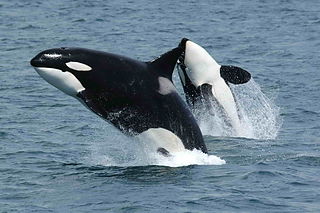
Allah is the common Arabic word for God. In the English language, the word generally refers to God in Islam. The word is thought to be derived by contraction from al-ilāh, which means "the god", and is linguistically related to the Aramaic words Elah and Syriac ܐܲܠܵܗܵܐ (ʼAlāhā) and the Hebrew word El (Elohim) for God.
The Domain Name System (DNS) is a hierarchical and distributed naming system for computers, services, and other resources in the Internet or other Internet Protocol (IP) networks. It associates various information with domain names assigned to each of the associated entities. Most prominently, it translates readily memorized domain names to the numerical IP addresses needed for locating and identifying computer services and devices with the underlying network protocols. The Domain Name System has been an essential component of the functionality of the Internet since 1985.
The terms foobar, foo, bar, baz, and others are used as metasyntactic variables and placeholder names in computer programming or computer-related documentation. They have been used to name entities such as variables, functions, and commands whose exact identity is unimportant and serve only to demonstrate a concept. The style guide for Google developer documentation recommends against using them as example project names because they are unclear and can cause confusion.
ISO 3166 is an ISO standard published by the International Organization for Standardization (ISO) that defines codes for the names of countries, dependent territories, special areas of geographical interest, and their principal subdivisions. The official name of the standard is Codes for the representation of names of countries and their subdivisions.
Y, or y, is the 25th and penultimate letter of the Latin alphabet, used in the modern English alphabet, the alphabets of other western European languages and others worldwide. According to some authorities, it is the sixth vowel letter of the English alphabet. In the English writing system, it mostly represents a vowel and seldom a consonant, and in other orthographies it may represent a vowel or a consonant. Its name in English is wye, plural wyes.
Genus is a taxonomic rank used in the biological classification of living and fossil organisms as well as viruses. In the hierarchy of biological classification, genus comes above species and below family. In binomial nomenclature, the genus name forms the first part of the binomial species name for each species within the genus.

In taxonomy, binomial nomenclature, also called binary nomenclature, is a formal system of naming species of living things by giving each a name composed of two parts, both of which use Latin grammatical forms, although they can be based on words from other languages. Such a name is called a binomial name, a binomen, binominal name, or a scientific name; more informally it is also historically called a Latin name. In the ICZN, the system is also called binominal nomenclature, "binomi'N'al" with an "N" before the "al", which is not a typographic error, meaning "two-name naming system".
In the Internet, a domain name is a string that identifies a realm of administrative autonomy, authority or control. Domain names are often used to identify services provided through the Internet, such as websites, email services and more. As of 2017, 330.6 million domain names had been registered. Domain names are used in various networking contexts and for application-specific naming and addressing purposes. In general, a domain name identifies a network domain or an Internet Protocol (IP) resource, such as a personal computer used to access the Internet, or a server computer.
A pseudonym or alias is a fictitious name that a person assumes for a particular purpose, which differs from their original or true name (orthonym). This also differs from a new name that entirely or legally replaces an individual's own. Many pseudonym holders use pseudonyms because they wish to remain anonymous, but anonymity is difficult to achieve and often fraught with legal issues.
A patronymic, or patronym, is a component of a personal name based on the given name of one's father, grandfather (avonymic), or an earlier male ancestor. It is the male equivalent of a matronymic.

The Stanley Cup is the championship trophy awarded annually to the National Hockey League (NHL) playoff champion. It is the oldest existing trophy to be awarded to a professional sports franchise in North America, and the International Ice Hockey Federation (IIHF) considers it to be one of the "most important championships available to the sport". The trophy was commissioned in 1892 as the Dominion Hockey Challenge Cup and is named after Lord Stanley of Preston, the Governor General of Canada, who donated it as an award to Canada's top-ranking amateur ice hockey club. The entire Stanley family supported the sport, the sons and daughters all playing and promoting the game. The first Cup was awarded in 1893 to the Montreal Hockey Club, and winners from 1893 to 1914 were determined by challenge games and league play. Professional teams first became eligible to challenge for the Stanley Cup in 1906. In 1915, the National Hockey Association (NHA) and the Pacific Coast Hockey Association (PCHA), the two main professional ice hockey organizations, reached a gentlemen's agreement in which their respective champions would face each other annually for the Stanley Cup. It was established as the de facto championship trophy of the NHL in 1926 and then the de jure NHL championship prize in 1947.

A surname, family name, or last name is the mostly hereditary portion of one's personal name that indicates one's family. It is typically combined with a given name to form the full name of a person.

A given name is the part of a personal name that identifies a person, potentially with a middle name as well, and differentiates that person from the other members of a group who have a common surname. The term given name refers to a name usually bestowed at or close to the time of birth, usually by the parents of the newborn. A Christian name is the first name which is given at baptism, in Christian custom.

A digital object identifier (DOI) is a persistent identifier or handle used to uniquely identify various objects, standardized by the International Organization for Standardization (ISO). DOIs are an implementation of the Handle System; they also fit within the URI system. They are widely used to identify academic, professional, and government information, such as journal articles, research reports, data sets, and official publications. DOIs have also been used to identify other types of information resources, like commercial videos.
Spanish names are the traditional way of identifying, and the official way of registering, a person in Spain and Hispanic America. They are composed of a given name and two surnames. Traditionally, the first surname is the father's first surname, and the second is the mother's first surname. Since 1999, the order of the surnames in a family in Spain is decided when registering the first child, but the traditional order is nearly universally chosen.
A birth name is the name given to a person upon birth. The term may be applied to the surname, the given name, or the entire name. Where births are required to be officially registered, the entire name entered onto a birth certificate or birth register may by that fact alone become the person's legal name.

In traditional festive legend and popular culture, Santa Claus's reindeer are said to pull a sleigh through the night sky to help Santa Claus deliver gifts to children on Christmas Eve.

A brand is a name, term, design, symbol or any other feature that distinguishes one seller's good or service from those of other sellers. Brands are used in business, marketing, and advertising for recognition and, importantly, to create and store value as brand equity for the object identified, to the benefit of the brand's customers, its owners and shareholders. Brand names are sometimes distinguished from generic or store brands.
A Uniform Resource Locator (URL), colloquially known as an address on the Web, is a reference to a resource that specifies its location on a computer network and a mechanism for retrieving it. A URL is a specific type of Uniform Resource Identifier (URI), although many people use the two terms interchangeably. URLs occur most commonly to reference web pages (HTTP/HTTPS) but are also used for file transfer (FTP), email (mailto), database access (JDBC), and many other applications.







